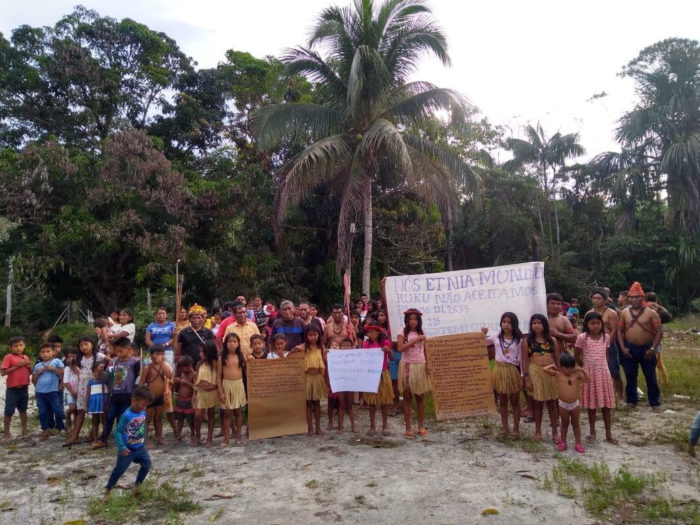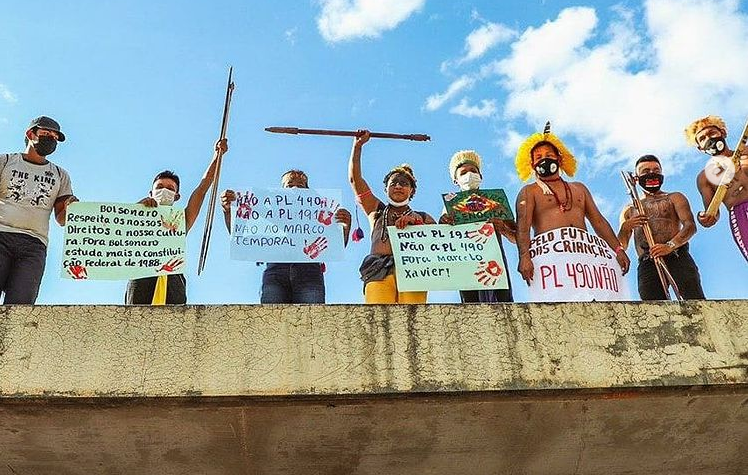For most of June, around 850 indigenous Brazilians from 43 different ethnic groups staged protests in the capital, Brasília. The police responded aggressively on more than one occasion, repeating some of the very rights violations against which the indigenous activists are protesting.
An annual indigenous demonstration which takes place every April in Brasília, the Acampamento Terra Livre, was held virtually for the second time running this year due to precautions over the coronavirus. But less than two months later, as Covid-19 remains a threat in a Brazil, indigenous leaders from across the country agreed to come together for an in-person protest, which has been dubbed the Acampamento Levante pela Terra (Stand Up for the Earth Camp, or ALT). ‘The installation of the Stand Up for the Earth camp was motivated by the [congressional] agenda of setbacks to indigenous rights,’ Dinamam Tuxá, an indigenous leader and the executive coordinator of APIB, the Brazilian association of indigenous people, said in a phone interview.
A series of bills are under discussion in congress which, if approved, would open the door to further rolling back safeguards for indigenous rights. Some of these initiatives were first submitted years ago, but they have gained new impetus under President Jair Bolsonaro’s administration, especially after Bolsonaro allies won internal elections for the presidency of both the senate and chamber of deputies earlier this year, thus gaining control of the congressional agenda.
One bill in particular has been the focus of the current mobilisation, which began on 8 June: PL 490, first tabled in 2007, and which was due to be submitted to a vote in the constitution and justice committee (CCJ) of the chamber of deputies in the first two weeks of the ALT demonstration. If voted into law, PL 490 would change the rules for the demarcation of indigenous lands and place new barriers to the recognition of new protected indigenous territories. COIAB, the Coordinator of Indigenous Organisations in the Brazilian Amazon, also denounces PL 490 as a threat to the country’s uncontacted tribes, noting that the bill would allow their territories to be opened up to what are vaguely termed ‘activities of public interest’ and increase the risk of their being forcefully contacted by missionaries.
‘We came from so far away to be here, for you to listen to us, but often you don’t listen… But we are here to say: stop. Cancel this PL 490’, Alessandra Korap Munduruku, an indigenous leader, said on 22 June. ‘They have the “right” to take away all of our rights, they want to take away our wellbeing, our dream’, she said of lawmakers who support the bill.
Police Repression
Korap Munduruku’s comments came after a demonstration was violently repressed by the police on 22 June. That day, protesters were met by a strong police presence as they approached one of the entrances to the chamber of deputies. Police fired tear gas and rubber bullets at the indigenous activists, who counted children and the elderly amongst them. APIB says that 14 indigenous people were injured, two of whom required hospital care. Some of the indigenous responded to the police violence with arrows, and the police say that three officers were injured in the confrontation.
‘We’ve been here for more than two weeks approximately, always going to the national congress in a peaceful and orderly way, singing, dancing, asking our ancestors to grant us strength and wisdom, and above all to get PL 490 dropped. Today, we encountered another state apparatus, with lots of police… I am sure that they had the intention of attacking us’, Tuxá said in a statement following the police repression.
In a separate interview, Tuxá noted that the police had broken an agreement reached between the ALT organisers and the Brasília security forces, blocking protesters’ access to an area previously agreed and meeting them with aggression. ‘Our objective was not confrontation’, he stressed.
FUNAI
Both the advance of an anti-indigenous legislative agenda and the use of police force against peaceful protesters starkly illustrate how the state apparatus is being used against Brazil’s indigenous peoples. Nowhere is the state’s role in the current dismantling of indigenous rights more visible than in FUNAI, the Fundação Nacional do Índio, the federal government agency responsible for indigenous affairs. FUNAI has an institutional duty under the country’s 1988s constitution to protect the rights of Brazil’s indigenous population – which numbers around 900,000 and occupies ancestral lands that span over an eighth of Brazil’s total surface.
A new director, Marcelo Augusto Xavier da Silva, was appointed by Bolsonaro to head FUNAI in July 2019. A federal police officer by training, Da Silva is close to the agribusiness lobby and supports the opening up of indigenous lands to mining – a long-standing objective of Bolsonaro. On Da Silva’s watch, FUNAI has issued a series of controversial regulations which attack indigenous rights and favour illegal land grabbers. In the same vein, the delimitation of new indigenous territories has all but halted in the last two years. Key positions in the agency have been filled with dubious appointments. In April, federal prosecutors raised concerns over the dismantling of FUNAI and the rolling back of the government’s indigenous policy, warning of a ‘framework of violations without precedent in the current constitutional order’.
‘There has been a weakening of the institution for ten years. But under this administration, [FUNAI] is not just failing to comply with its constitutional duties, it is actively going against them’, Tuxá says, adding that the agency now appears to be siding with agribusiness interests which have traditionally been at odds with the protection of indigenous rights.
The reception given to an indigenous demonstration in front of the FUNAI headquarters on 17 June epitomises how the agency is now failing the very people it is supposed to be protecting. The protesters were pushed back by the police, and a request from indigenous leaders for an audience with FUNAI director Da Silva was rejected.
The fights continues

Despite the ALT mobilisation, which led to the committee stage discussion of PL 490 being twice postponed, the bill was eventually approved in the chamber’s CCJ by 40 votes to 21 on 23 June. This means the bill can now go forward to a vote in the full chamber, although no date has yet been set for its discussion.
‘We think that the bill’s approval by the chamber is inevitable’, Tuxá says. But the fight does not end there. Indigenous representatives are holding discussions with senators, who must also approve the bill before it becomes law, a process that could take weeks or months. They are lobbying for a public hearing on the bill to be held in congress, which would allow for a more ample and transparent debate around the implications of the law, and thus increase the chances of it being blocked. The indigenous activists are also trying to get public opinion on their side, working with artists, actors, and other public figures to inform the wider population of the negative consequences of PL 490 being approved.
A supreme court (STF) vote on a land dispute opposing the Xokleng indigenous people to the environment institute of Santa Catarina state (IMA) could help raise judicial barriers to the application of PL 490, even if it is passed into law. In this case, the STF will effectively be ruling on the validity of the so-called ‘marco temporal’, a legal interpretation which determines that indigenous peoples can only lay claim to lands which they occupied as of 5 October 1988. A ruling against the ‘marco temporal’ would set a judicial precedent which could be used to block harmful projects such as PL 490. The vote was initially due to take place on 30 June but has now been postponed until August.
If all else fails, APIB will take the issue to international institutions. There is a lot of interest and scrutiny abroad of the Brazilian situation, Tuxá believes. A complaint against Bolsonaro, accusing him of inciting genocide of Brazil’s indigenous peoples, is slowly advancing through the International Criminal Court (ICC) in The Hague. This month, the UN Human Rights Council rebuked the Bolsonaro government over its negligence of indigenous peoples and their rights. Tuxá’s hope is that ‘international institutions could get involved and help us overturn the law’.
Main image: Indigenous demonstrators in Brasilia. Photo: Cultural Survival

